Adaptation finance ‘make or break’ for Africa: Global Leaders Double Down on Calls for Increased Adaptation Funding
D
ubai, United Arab Emirates, 1 December 2023 – Global leaders gathered today for the Adaptation Finance Summit for Africa at the World Climate Action Summit of COP28 hosted by Macky Sall, President of Senegal, and convened by Prof. Patrick Verkooijen, CEO of the Global Center on Adaptation (GCA) and Dr. Akinwumi Adesina, President of the African Development Bank Group (AfDB).
Summit leaders expressed alarm that the global climate crisis was putting unprecedented strain on the world’s most climate-vulnerable continent in a ‘make or break’ situation for Africa and the world. The Summit’s communique said that climate adaptation finance could still enable the continent to chart a resilient course, if rapidly scaled-up financial support in line with UN promises came behind key regional programs in particular the Africa Adaptation Acceleration Program (AAAP), the world’s largest climate adaptation financing program.
Africa currently receives only 20% of all climate adaptation finance flows globally, significantly short of the 5 to 10 times of the estimated $2.8 trillion through 2030 of additional financial resources required for Africa to effectively adapt to the climate crisis. According to the AfDB’s latest African Economic Outlook report current finance flows (2021-22) represent just 15–30% of assessed annual adaptation needs of the continent.
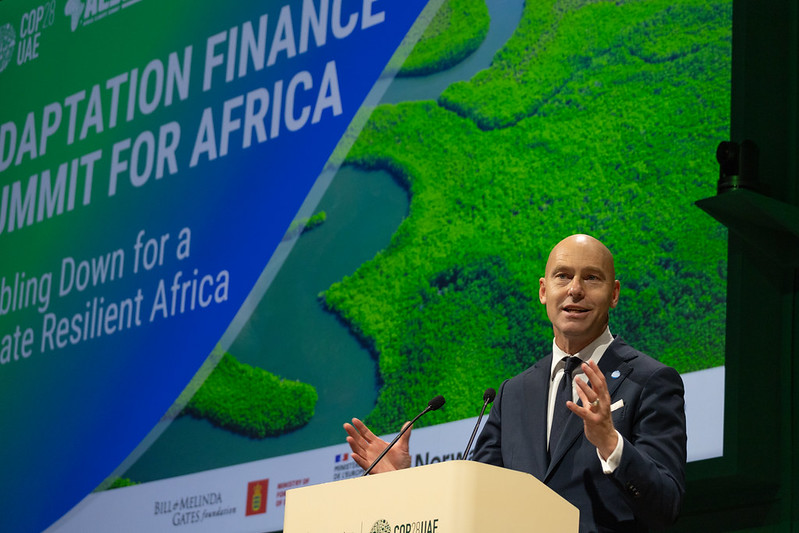
Opening the event, Prof. Verkooijen noted the progress that has already been made across the continent through the AAAP towards mobilizing $25 billion for climate adaptation in Africa:
“Two years ago, Africa put the AAAP on the table as its homegrown solution. Two years later, the AAAP is delivering: nearly $7 billion of investments already shaped; 150 million more Africans now climate-resilient; 630,000 new jobs created and more than half the countries in Africa participating. In two short years, a lot has been achieved but there is so much more to be done.”
He recognized the pledges of Denmark, France, the Netherlands, Norway, and the United Kingdom to prioritize Africa in their adaptation finance scaling efforts, including through support to AAAP, and called on other developed nations to take similar steps to close the adaptation finance gap affecting African nations on the climate frontlines.
To deploy climate adaptation resources more effectively, AfDB and GCA announced they are supporting the development of AAAP Climate Adaptation Compacts in eight countries: Benin, Cabo Verde, Congo, Democratic Republic of Congo, Equatorial Guinea, Ethiopia, Kenya, Liberia, Morocco, Mozambique, Nigeria, Senegal, and Tanzania. These Compacts allow investors in climate adaptation at the country level to identify the most strategic and catalytic investments in climate resilience, and contribute to the scaling of financing and core national deliverables on climate adaptation.
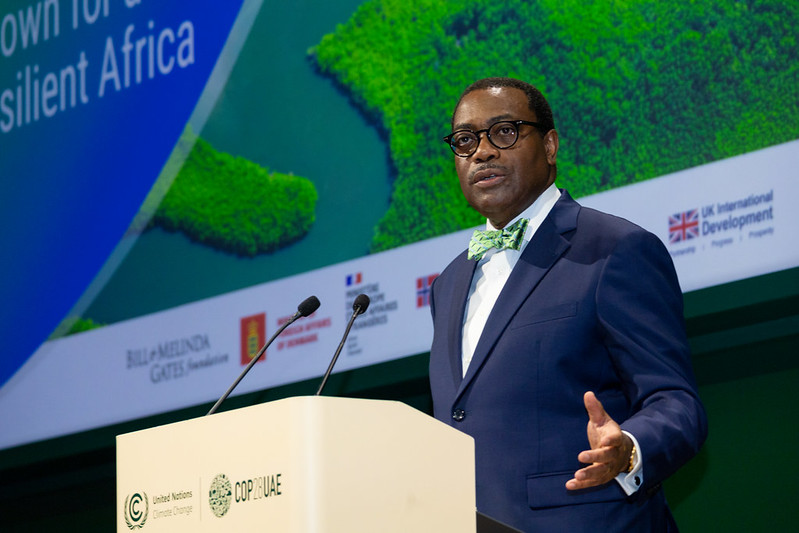
Dr. Adesina spoke about how the African Development Bank is responding strongly to the climate adaptation needs of Africa, devoting 63% of its total climate finance to adaptation—the highest share among all multilateral development banks globally. He noted that the Climate Action Window of the African Development Fund has received $429 million from the United Kingdom, Netherlands, Germany, and Switzerland and AfDB plans to mobilize up to $14 billion for the Climate Action Window, to support climate adaptation across Africa’s 37 low-income countries.
“I am pleased to announce here today that the operationalization of the Climate Action Window starts right here, at this COP, as we launch the first Call for Proposals this week. Today, I request for more donors and foundations to join the Climate Action Window. Together, let us deliver climate-resilient agricultural technologies for 20 million farmers; deliver weather insurance for 20 million farmers; rehabilitate one million hectares of degraded lands; provide water, sanitation and health services to 18 million people; and renewable energy for close to 10 million people.”
Dr. Adesina also announced the launch of the Africa Climate Risk Insurance for Adaptation (ACRIFA), a $1 billion facility that will help to insure countries against extreme weather patterns.

President Macky Sall, hosting the Summit, spoke about how climate adaptation finance to Africa is currently overwhelmingly flowing in the form of debt, acknowledging the strain of debt on regional economies. He highlighted the need to shift to alternative forms of finance, including grants, guarantees, and other innovative forms of finance: “Africa is not asking for a special favor but for a fair and equitable approach to the fight against global warming. It is right that the cost of adaptation be equitably distributed. Our countries must not be condemned to choose between development and environmental protection. They must do both. Common sense is developing while protecting the environment.” He noted how Senegal is exploring debt for climate swaps: “Senegal proposes to explore with the International Monetary Fund and partner countries, as well as the Global Center for Adaptation, the possibility of financing green projects with resources provided for debt repayment, in order to support the implementation of the Africa Adaptation Acceleration Program.”
The Summit, moreover, noted that only 12% of climate adaptation finance flows to Sub-Saharan Africa are private, compared to between 40-80+% of flows for all other regions, underscoring the further need for a Marshall Plan to unlock private finance for climate adaptation.
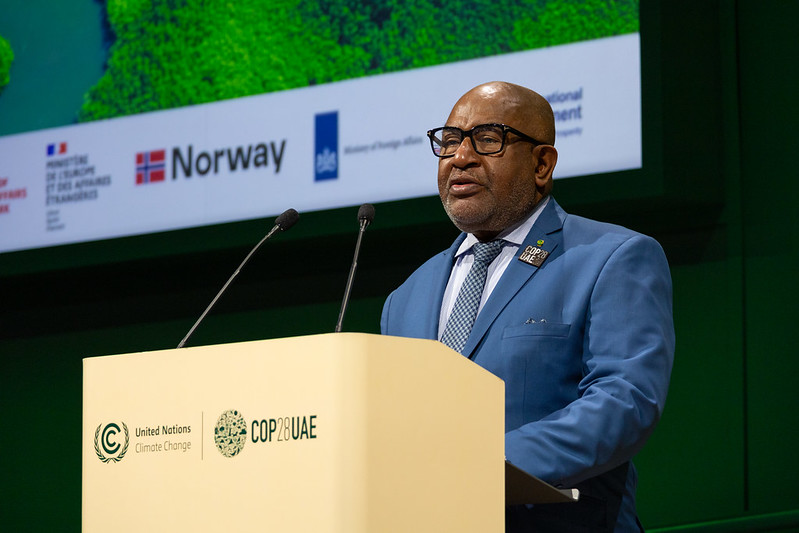
Azali Assoumani, President of Comoros and Chairperson of the African Union echoed his remarks in saying: “Our ability to adapt will also depend on our ability to mobilize the necessary funds for the implementation of much more innovative mechanisms. Africa still remains far behind when it comes to international financing for adaptation. The situation can no longer remain like this because insufficient investment and lack of planning in terms of adaptation to climate change risk compromising the future of our continent.”

Samia Suluhu Hassan, President of Tanzania, announced new initiatives with GCA to raise finance for AAAP for adaptation in Tanzania:
“During this COP28, CGA will formalize partnerships under AAAP to provide technical support for $700 million in private finance through green bonds issued by two Tanzanian commercial banks. In Tanzania, GCA is working with our partners to bring innovative adaptation solutions to unlock much-needed climate finance. I can confirm that the AAAP is working well in our part. I call on our partners to join us on a pledge to move from announcements to action as Tanzania supports the convening of a meeting of the ministerial conference for Adaptation Finance for Africa in 2024 to further mobilize investments for the AAAP.”
The Adaptation Finance Ministerial for Africa will review progress towards scaling adaptation finance across key instruments like the AAAP and the IMF Resilience and Sustainability Fund will be reviewed alongside the presentation and implementation reviews of new adaptation compacts and their financing.

Lord David Cameron, Secretary of State for Foreign, Commonwealth and Development Affairs, United Kingdom spoke about the British commitment for the funding of adaptation:
“Adaptation is seen as the orphan child of mitigation—but in Africa today it is not about what might be necessary in the future, it’s about what is necessary now. Crops are being ruined, farmers are struggling now. Alongside commitment, it requires cash. The UK is going further. We were spending £5 million in 2019 and by 2025, we will be spending £1.5 billion on adaptation.”
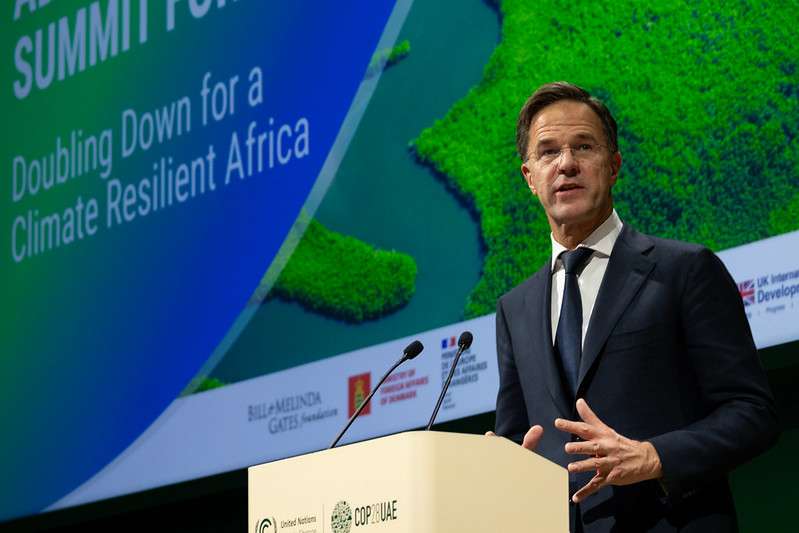
Mark Rutte, Prime Minister of the Kingdom of the Netherlands spoke about the importance of public sector finance for adaptation:
“Adaptation can bring significant investment opportunities as was clearly stated during the Africa Climate Summit. Public Finance needs to help unlock that potential.”
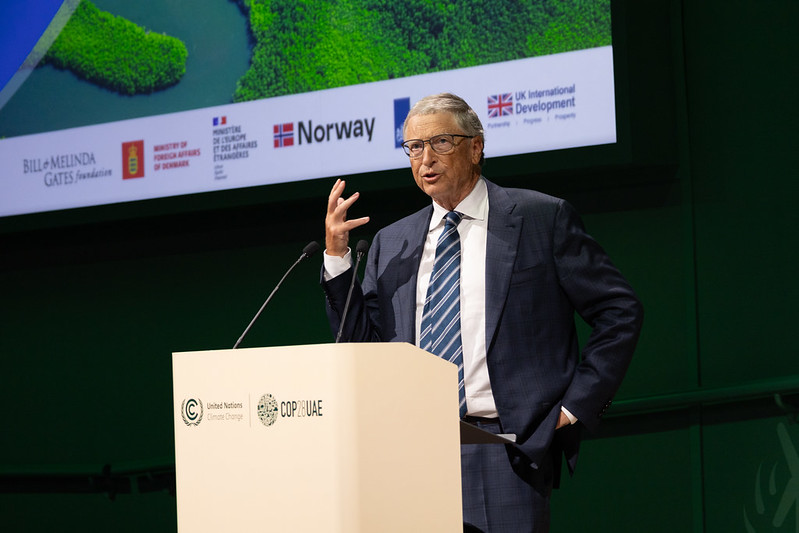
Bill Gates, Co-chair of the Bill & Melinda Gates Foundation spoke about the impact of climate change on Africa’s smallholder farmers:
“The majority of suffering coming from climate change comes from smallholder farmers. It is possible to help raise farmers’ productivity this farmers in many ways. There is no reason why we should not be able to double productivity in key countries. Even in the face of population growth and climate change we can improve nutrition. The majority of what we need to do [for adaptation] is in food security. We need additional dollars for climate adaptation […] We are falling short.”
GCA signed a partnership with CGIAR, the world’s largest agricultural research network, supported by the Bill & Melinda Gates Foundation to match the latest innovations to address hunger, malnutrition, poverty, and natural resource degradation to create a new ‘conveyer belt’ to international financial institution funding streams for translating knowledge into action at speed and scale.
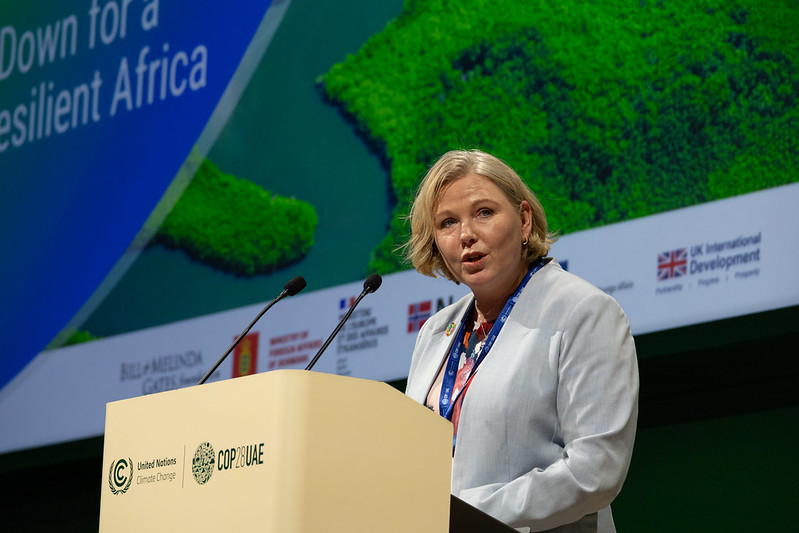
Anne Beathe Tvinnereim, Minister of International Development, Norway spoke about her country’s commitment to climate adaptation and the work GCA is doing in this area:
“We already committed to doubling climate finance by 2026 and achieved that target last year […] Norway considers GCA to be a very key partner in this work. We have entered into a new three-year agreement to strengthen this collaboration.”
As a founding partner of the AAAP, Norway’s support has helped GCA provide support to improve food and nutrition security and strengthen the resilience and adaptive capacity of infrastructure and cities by influencing the design of more than $6.7 billion in investments that aim to strengthen resilience for up to 147 million people to climate change and generate 630,000 jobs.
Norway’s contribution to the AAAP has also supported youth-led enterprises focused on climate adaptation through the YouthADAPT business accelerator which has invested more than $3 million to scale innovative enterprises with seed funding and an intensive business coaching mentorship program. These investments have already helped create almost 8,000 jobs in sectors such as waste management, drip irrigation, and agriculture. GCA is also supporting ten African countries to enable direct access to multilateral climate funds like the Green Climate Fund and the Adaptation Fund.
The Summit showcased the key priorities and financing initiatives for scaling climate adaptation action in Africa, highlighting a number of critical key messages for global attention summarised in their communique.